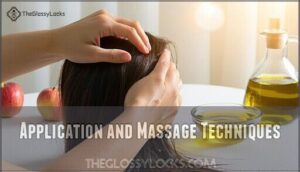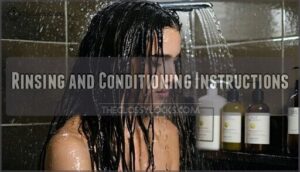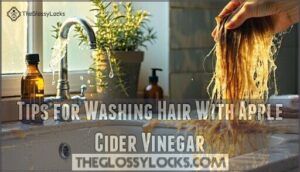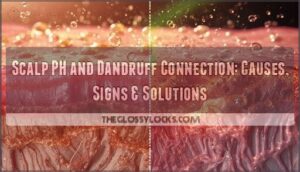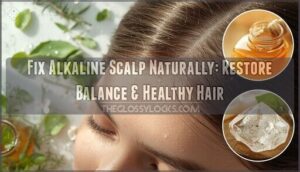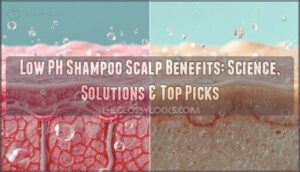This site is supported by our readers. We may earn a commission, at no cost to you, if you purchase through links.
 When you wash your hair with apple cider vinegar, you’re giving your locks a natural reset.
When you wash your hair with apple cider vinegar, you’re giving your locks a natural reset.
This kitchen staple works by balancing your scalp’s pH and dissolving stubborn buildup that regular shampoo can’t touch.
Mix 1-2 tablespoons with a cup of water, pour it through clean hair, and watch as the acidity smooths your cuticles for instant shine.
The antimicrobial properties also help tackle dandruff and oily roots.
It’s like hitting refresh on your hair care routine.
However, proper dilution is essential—undiluted vinegar can irritate your scalp or strip your hair.
The secret lies in finding your perfect ratio and timing.
Table Of Contents
- Key Takeaways
- Benefits of Apple Cider Vinegar for Hair
- Choosing The Right Apple Cider Vinegar
- How to Use Apple Cider Vinegar for Hair
- Apple Cider Vinegar Hair Rinse Recipe
- Tips for Washing Hair With Apple Cider Vinegar
- Potential Risks and Side Effects
- Maintaining Healthy Hair With Apple Cider Vinegar
- Frequently Asked Questions (FAQs)
- Is apple cider vinegar good for washing hair?
- How do you wash your hair with apple cider vinegar?
- Does ginger juice help with hair fall?
- Does an apple cider vinegar hair rinse work?
- What does washing your hair with apple cider vinegar do?
- Will apple cider vinegar strip hair color?
- What are the side effects of apple cider vinegar on hair?
- Can apple cider vinegar harm colored hair?
- How often should I use an ACV rinse?
- Does ACV affect scalp pH balance?
- Conclusion
Key Takeaways
- Dilute properly to avoid damage – Mix 1-2 tablespoons of ACV with a cup of water, since undiluted vinegar can burn your scalp and strip your hair.
- Use it weekly for pH balance – ACV’s acidity restores your scalp’s natural pH level of 4.5-5.5, which flattens cuticles and reduces frizz while adding shine.
- Choose raw, unfiltered ACV with "mother" – You’ll get maximum benefits from the cloudy, enzyme-rich varieties that contain beneficial bacteria and proteins.
- Apply after shampooing, before conditioning – Massage the diluted solution into your scalp, let it sit for 2-3 minutes, then rinse thoroughly with cool water.
Benefits of Apple Cider Vinegar for Hair
You’ll discover that apple cider vinegar offers your hair impressive benefits thanks to its unique acidic properties and natural compounds.
This kitchen staple can transform your hair care routine by addressing common scalp issues while promoting healthier, shinier locks.
Balancing Hair PH
Your hair’s pH levels naturally sit around 4.5-5.5, but alkaline shampoos can throw this balance off.
Apple cider vinegar’s acidic properties help restore your hair pH balance by lowering it back to that sweet spot.
When your scalp health is in check, cuticles flatten, creating shinier locks and reducing frizz naturally.
Antibacterial and Antifungal Properties
You’ve got nature’s powerhouse working for your scalp health when you use apple cider vinegar‘s antibacterial and antifungal properties.
This natural hair care solution maintains acidic balance while delivering antimicrobial benefits that tackle troublesome issues:
- Combat fungal infections that cause persistent dandruff
- Reduce bacterial growth that leads to scalp irritation
- Clear product buildup that clogs follicles
The use of apple cider vinegar promotes hair growth benefits by rebalancing the scalp’s pH levels.
Your scalp deserves this gentle yet effective treatment!
Smoothing Down Hair Cuticle
Beyond fighting bacteria and fungus, ACV works like nature’s hair smoother.
When you rinse with diluted apple cider vinegar, its acidity helps seal your hair cuticle, creating that coveted smooth finish. This cuticle closure transforms frizzy, unruly strands into silky perfection.
| Hair Condition | Before ACV Rinse | After ACV Treatment |
|---|---|---|
| Frizz Level | High, unmanageable | Noticeably reduced |
| Shine Quality | Dull, lackluster | Enhanced, reflective |
| Smoothness | Rough, tangled | Silky, detangled |
| Cuticle State | Raised, damaged | Sealed, protected |
| Manageability | Difficult styling | Easy, cooperative |
Your hair cuticle acts like tiny shingles on a roof. ACV’s pH helps these "shingles" lay flat, preventing moisture loss and boosting shine enhancement naturally.
Promoting Healthy Hair Growth
Want stronger, healthier hair? Apple cider vinegar creates the perfect scalp environment for hair growth.
This natural remedy removes buildup that blocks hair follicles, while its alpha hydroxy acids gently exfoliate your healthy scalp.
The improved pH balance from an ACV hair rinse supports better circulation, giving your natural hair care routine the boost it needs for ideal hair growth promotion.
Using an apple cider vinegar hair rinse can help achieve these benefits by balancing the hair’s pH level and restoring its natural shine.
Treating Clogged Hair Follicles
When your hair follicles get clogged with product buildup, ACV’s acidic nature acts like a gentle detox warrior.
This vinegar therapy breaks down stubborn residue, promoting follicle health through natural scalp detox.
The antimicrobial properties in an ACV hair rinse clear blockages while soothing irritation.
Think of it as spring cleaning for your scalp—this clarifying hair rinse unclogs follicles, letting your hair breathe freely again.
Choosing The Right Apple Cider Vinegar
When choosing apple cider vinegar for your hair, you’ll want to select raw, organic, unfiltered, and unpasteurized varieties that contain the "mother" – those cloudy strands floating at the bottom aren’t a mistake, they’re the good stuff.
The mother contains beneficial enzymes, proteins, and friendly bacteria that give ACV its powerful hair-boosting properties.
Making it far more effective than clear, processed versions you might find on regular grocery shelves, due to its powerful hair-boosting properties.
Raw, Organic, Unfiltered, and Unpasteurized
Looking beyond ACV’s amazing benefits, choosing the right type makes all the difference. Not all apple cider vinegar delivers equal results for your hair detox journey.
Here’s what makes quality raw ACV stand out:
- Raw processing preserves natural enzymes that boost scalp health
- Organic certification eliminates harmful pesticides from your natural remedies routine
- Unfiltered varieties retain beneficial sediment with acidic properties
- Unpasteurized options maintain live cultures for maximum vinegar benefits
- "Mother" presence indicates authentic, nutrient-rich apple cider vinegar
Skip the clear, processed versions – they’re like buying a sports car with no engine! Using pH balance techniques can help regulate your scalp’s natural acidity.
Importance of The Mother of Vinegar
When choosing raw ACV, look for the "mother" – those cloudy, stringy bits floating inside. This colony of beneficial bacteria and enzymes forms during the fermentation process, creating the acetic acid that gives ACV its vinegar benefits.
The "mother" maintains bacterial balance and preserves raw ingredients, making natural ACV with mother far superior to filtered versions for hair care. Using high quality raw ACV products is essential for maximizing the benefits of apple cider vinegar for hair treatment.
| Feature | With Mother | Without Mother |
|---|---|---|
| Appearance | Cloudy, stringy sediment | Clear, transparent liquid |
| Beneficial bacteria | High concentration | Minimal to none |
| Hair treatment effectiveness | Maximum potency | Reduced benefits |
How to Use Apple Cider Vinegar for Hair
Now you can easily transform your regular shampoo routine by adding a simple ACV rinse that works wonders for your hair and scalp health.
The key lies in proper dilution and application techniques to maximize benefits while avoiding potential irritation from this powerful natural ingredient, using proper techniques is essential.
Dilution Ratio and Concentration
Getting acidic levels right prevents scalp damage and maximizes benefits.
**Perfect dilution ratios unlock ACV’s hair benefits while protecting your scalp from damage.
Proper dilution methods guarantee your DIY hair rinse works safely while maintaining pH balance.
- Oily hair: 1:4 ACV to water ratio for stronger vinegar strength
- Dry/sensitive hair: 1:8 ratio with gentler concentration tips
- Standard formula: 2 tablespoons ACV per 8 oz water
- Test first: Start weaker, then adjust your ACV hair rinse recipe
Application and Massage Techniques
Once you’ve prepared your diluted ACV solution, gently massage it into your scalp using your fingertips.
This scalp massage promotes hair stimulation and guarantees even vinegar application throughout your hair.
Focus on problem areas while maintaining gentle pressure—your scalp will thank you for the attention and improved circulation that comes with proper massage benefits.
Rinsing and Conditioning Instructions
After applying your vinegar treatment, proper rinsing guarantees maximum benefits without scalp irritation.
Follow these steps to complete your DIY hair rinse effectively:
- Rinse thoroughly – Pour cool water over your entire head, ensuring complete ACV dilution removal from scalp and strands.
- Apply conditioner sparingly – Focus on mid-lengths and ends to restore moisture while maintaining pH balance benefits.
- Final cold rinse – Seal hair cuticles with cool water for enhanced shine and smoother texture.
Precautions and Safety Measures
After rinsing, keep your eyes safe—ACV stings like a bee if it sneaks in.
Always dilute to dodge scalp irritation, hair damage, or acid burns. Patch-test on your skin first, especially if you’re sensitive.
Overdoing it can mess with hair pH, causing hair burning or dryness. ACV hair rinse precautions matter—don’t let curiosity lead to discomfort!
Understanding the hair growth benefits is essential for effective treatment.
Apple Cider Vinegar Hair Rinse Recipe
Creating your apple cider vinegar hair rinse is surprisingly simple and requires just two basic ingredients you probably have at home.
You’ll want to customize the dilution ratio based on your specific hair type and concerns to get the best results without irritation, using this method to achieve optimal results.
Basic Recipe and Ingredients
Creating your DIY hair rinse starts with the perfect ACV ratio: mix 2-4 tablespoons of raw apple cider vinegar with 16 ounces of water.
This ingredient list couldn’t be simpler! Choose high-quality vinegar for hair with the "mother" for maximum benefits.
Mixing tips: stir thoroughly in a glass container. This natural hair care formula balances your scalp’s pH beautifully.
Using a cider vinegar product can enhance the effectiveness of your hair rinse.
Customizing The Recipe for Hair Type
Different hair types need customized dilution ratios for ideal results.
Fine hair thrives with weaker solutions—try one tablespoon ACV per cup water to prevent dryness.
Thick, coarse hair handles stronger concentrations, up to ¼ cup per cup water.
Curly hair requires gentler ratios since high acidity disrupts curl patterns and moisture.
Color-treated hair needs minimal vinegar—just one teaspoon per cup prevents fading while maintaining pH balance.
It is crucial to use the right amount of vinegar to achieve the desired results without damaging the hair, using customized dilution ratios.
Tips for Measuring and Mixing
Perfect measurements make all the difference in your DIY hair rinse preparation.
Here’s how to nail your ACV dilution every time:
- Use proper measurement tools – measuring cups facilitate accurate dilution ratios (typically 1:5 ACV to water)
- Check ACV concentration – start with weaker mixing techniques for sensitive scalps
- Follow safety precautions – thorough stirring prevents hot spots that could irritate
Consistent ACV application starts with precise vinegar hair benefits through careful hair rinse preparation.
Understanding the hair porosity effects is vital for exceptional results.
Tips for Washing Hair With Apple Cider Vinegar
Getting your apple cider vinegar hair routine right takes some practice, but the results are worth it when you follow a few key guidelines.
You’ll want to pay attention to timing, mixing ratios, and how often you use it to avoid damaging your hair or scalp.
Frequency and Timing of Use
Finding your ACV sweet spot depends on your hair’s unique needs and scalp sensitivity.
Most people benefit from weekly usage, while those with oilier hair might need twice-weekly applications. Start conservatively—your scalp will thank you.
Timing Guidelines for ideal results:
- Begin with once weekly, then adjust based on hair type response
- Apply ACV hair rinse after shampooing but before conditioning
- Monitor scalp sensitivity and reduce application frequency if irritation occurs
Listen to your hair’s feedback and customize your ACV dilution accordingly.
Combining With Shampoo and Conditioner
Weave apple cider vinegar seamlessly into your routine alongside regular shampoo and conditioner.
Use your ACV hair rinse as one of several effective hair clarifiers after shampooing, before conditioning.
These scalp balancers and pH regulators work as excellent shampoo boosters, enhancing your usual products.
Consider ACV rinse preparation as conditioner alternatives for oily hair types.
Using an apple cider shampoo can also enhance the benefits of your hair care routine.
Avoiding Overuse and Irritation
While proper dilution prevents most issues, overdoing apple cider vinegar can irritate your scalp.
Your hair deserves better than chemical burns from excessive acidity levels.
Follow these Safe Frequency guidelines:
- Dilution Guidelines: Mix 2-4 tablespoons with 16 ounces water to control hair acidity
- Scalp Sensitivity: Watch for Irritation Signs like redness or burning sensations
- Limit use to once weekly—hair overdoing disrupts scalp pH balance
Potential Risks and Side Effects
While apple cider vinegar offers many hair benefits, you’ll want to know about potential downsides before adding it to your routine.
Improper use can cause scalp irritation, dryness, and even chemical burns if you don’t dilute it properly, which highlights the importance of proper use.
Skin and Scalp Irritation
While apple cider vinegar offers hair benefits, skin sensitivity can cause problems.
Scalp redness and irritation causes stem from ACV’s acidity disrupting your skin’s natural pH balance.
Acidic reactions vary by person, making burn prevention essential through proper dilution.
| Irritation Level | Symptoms | Action Needed |
|---|---|---|
| Mild | Slight tingling, temporary redness | Continue with more dilution |
| Moderate | Persistent scalp irritation, burning sensation | Stop use, rinse immediately |
| Severe | Intense burning, welts, chemical burns | Seek medical attention |
Always start slowly—your scalp will thank you later!
Eye Irritation and Safety Precautions
Eye contact with undiluted ACV can cause serious acid burns and intense stinging. Eye Protection starts with proper Vinegar Dilution and careful application techniques.
Protect yourself with these essential safety measures:
- Tilt your head back during rinsing to prevent drips
- Keep eyes tightly closed throughout the entire process
- Have clean water ready for immediate flushing if eye contact occurs
Always prioritize Eye Safety over convenience when using this acidic treatment.
Limited Research and Efficacy
Unfortunately, most hair ACV benefits you’ll hear about aren’t backed by solid scientific evidence.
Clinical trials specifically testing apple cider vinegar for hair care are virtually nonexistent. Research gaps are significant—dermatology associations don’t recognize ACV as proven treatment for dandruff or hair pH regulation.
| Evidence Type | Reality Check |
|---|---|
| Peer-reviewed studies | Almost none exist for hair applications |
| Clinical trials | Zero randomized controlled trials |
| Professional endorsement | Not recommended by dermatologists |
| Mechanism proof | Extrapolated from general vinegar properties |
| Efficacy studies | Rely on testimonials, not research |
While ACV for hair sounds promising, study limitations mean you’re basically experimenting on yourself.
Most claims come from beauty blogs rather than laboratories.
Maintaining Healthy Hair With Apple Cider Vinegar
Making apple cider vinegar a regular part of your hair care routine can transform your hair health over time.
You’ll notice stronger, shinier strands and a healthier scalp when you use it consistently and correctly.
Long-Term Benefits and Effects
With consistent apple cider vinegar use, you’ll experience remarkable hair transformation over time.
This natural hair care powerhouse delivers sustained results through gentle hair pH regulation and effective hair detox properties.
- Hair Growth: ACV hair rinse benefits include unclogging follicles, boosting density by 15% over six months.
- Shine Enhancement: Regular use increases hair shine intensity by 25% while supporting Color Preservation.
- Scalp Health: Reduces flakiness by 60%, promoting Frizz Reduction through balanced microbiome maintenance.
Tips for Maintaining Healthy Hair and Scalp
When building your hair care routine with apple cider vinegar, consistency trumps intensity.
Use your hair rinse once weekly to maintain pH balance and scalp health.
Between treatments, stick to gentle natural hair care products that won’t disrupt your progress.
Remember, healthy hair grows from a balanced scalp treatment approach—your natural remedies work best when paired with patience and proper hair growth habits.
Frequently Asked Questions (FAQs)
Is apple cider vinegar good for washing hair?
Raw apple cider vinegar’s pH of 2-3 creates powerful clarifying effects.
You’ll love how it balances your scalp’s pH, removes buildup, and adds shine.
However, always dilute it first—pure ACV can irritate or burn your scalp, which is why dilute is crucial for a safe application.
How do you wash your hair with apple cider vinegar?
Mix two tablespoons of raw apple cider vinegar with one cup of water.
After shampooing, massage this diluted mixture into your scalp and hair, let it sit for 2-3 minutes, then rinse thoroughly with cool water.
Does ginger juice help with hair fall?
Ginger juice shows mixed results for hair fall.
While traditionally used in East Asia for hair growth, recent studies suggest compounds like 6-gingerol may actually inhibit hair shaft growth.
Experts now warn it can suppress hair growth rather than promote it.
Does an apple cider vinegar hair rinse work?
Apple cider vinegar’s pH of 2-3 makes it effective for balancing your scalp’s natural 4-5 pH level.
You’ll see shinier hair, reduced buildup, and better manageability when used properly diluted once weekly.
What does washing your hair with apple cider vinegar do?
Washing your hair with apple cider vinegar balances pH, removes buildup, adds shine, reduces frizz, treats dandruff, and promotes scalp health through its natural acids and antimicrobial properties.
Will apple cider vinegar strip hair color?
Like walking through a minefield, you’ll want to tread carefully—ACV won’t completely strip hair color when properly diluted and used sparingly.
But it can gradually fade color-treated hair with frequent use.
What are the side effects of apple cider vinegar on hair?
You’ll experience scalp irritation, dryness, and potential burns if you don’t dilute ACV properly. Overuse strips natural oils, making hair brittle and frizzy, especially on sensitive scalps.
Can apple cider vinegar harm colored hair?
Your hair’s vibrant canvas faces risk when ACV’s acidic nature meets chemical dyes.
While generally safe when properly diluted, overuse can fade color and cause dryness, so limit to twice weekly maximum.
How often should I use an ACV rinse?
Use an ACV rinse once or twice weekly after shampooing.
Start with once weekly and adjust based on your hair’s response.
Overuse can cause dryness and scalp irritation, so listen to your hair’s needs.
Does ACV affect scalp pH balance?
Yes, ACV dramatically affects your scalp’s pH balance by lowering it from alkaline levels back to the ideal acidic range of 4-5, which restores natural balance and promotes healthier hair.
Conclusion
Surprisingly, washing your hair with apple cider vinegar isn’t just a trendy hack—it’s backed by science.
The acidic pH level actually counteracts alkaline buildup from styling products and hard water.
When you wash your hair with apple cider vinegar regularly, you’re restoring your scalp’s natural balance while adding shine and reducing frizz.
Start slowly with a weekly rinse, listen to your hair’s response, and adjust accordingly, which is a simple and effective way to reset your hair care routine.
Your locks will thank you for this simple, effective reset.
- https://hairlust.com/blogs/blog/acv-for-scalp-and-hair
- https://www.hims.com/blog/apple-cider-vinegar-for-hair-loss
- https://www.businessinsider.com/apple-cider-vinegar-for-hair-2019-3
- https://www.bragg.com/blogs/hacks/apple-cider-vinegar-hair-rinse-1
- https://www.clinicana.com/blog/apple-cider-vinegar-for-hair/



